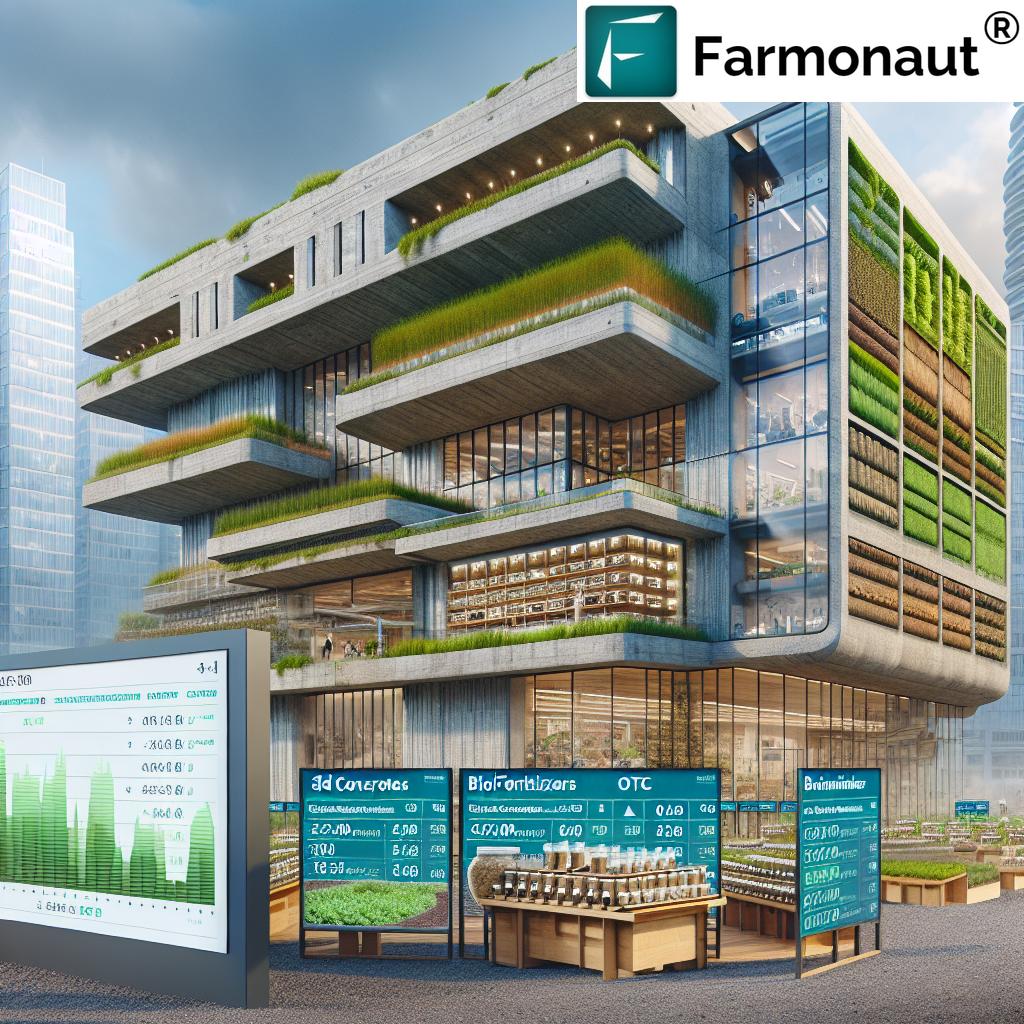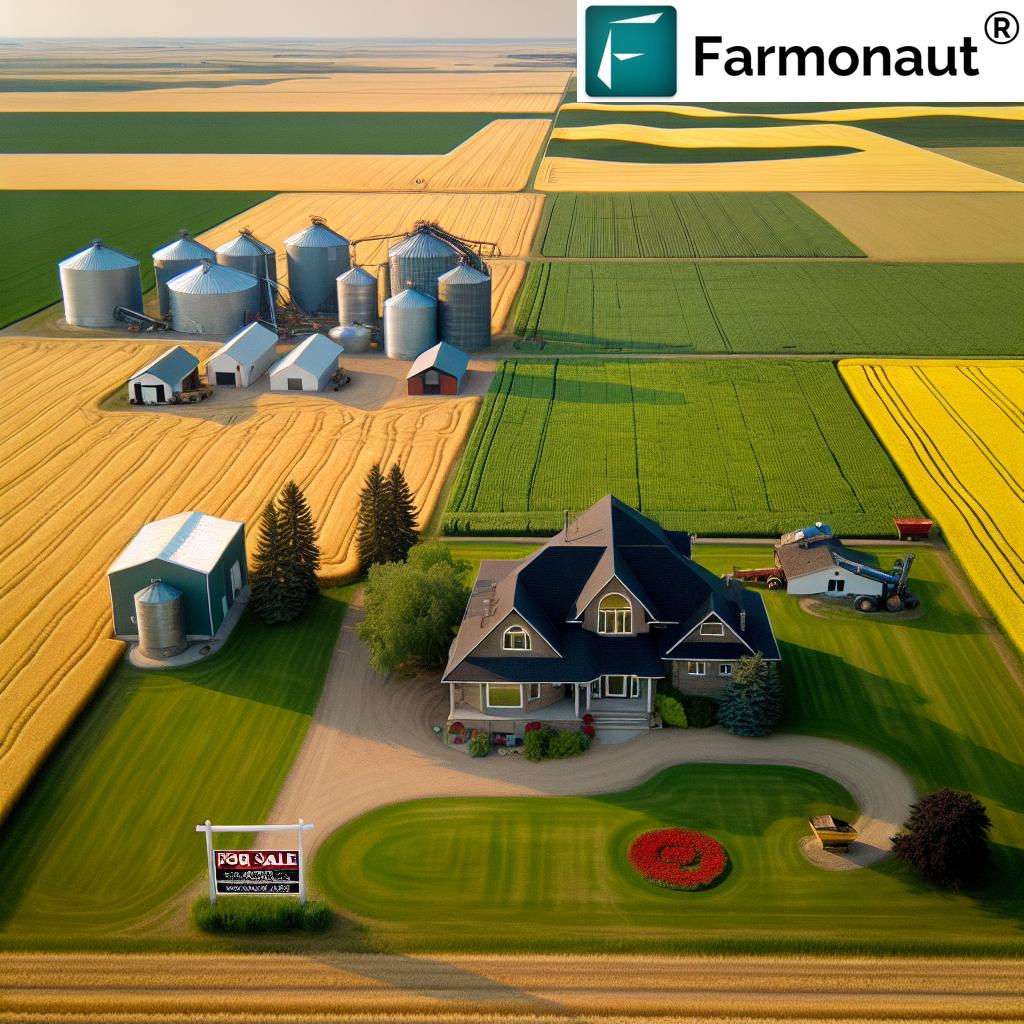Sustainable Agriculture Meets Green Tech: Vancouver’s Rising Star in OTCQB Venture Market
“Biochar in agriculture can increase crop yields by up to 25% while reducing fertilizer use by 10-30%, promoting sustainable farming practices.”
In the ever-evolving landscape of sustainable agriculture and green technology, Vancouver, British Columbia is emerging as a hotbed of innovation. At the forefront of this revolution is Argo Living Soils Corp. (CSE: ARGO) (OTCQB: ARLSF) (FSE: 94Y0), a company that has recently made waves by upgrading to the OTCQB Venture Market. This significant milestone not only highlights the growing importance of sustainable solutions in the agricultural sector but also signals a new era of growth and accessibility for investors interested in eco-friendly agricultural technologies.

As we delve into the world of sustainable agriculture solutions and environmentally friendly products, it’s crucial to understand the transformative power of innovations such as biochar, biofertilizers, and living soils. These advancements are not just revolutionizing farming practices; they’re paving the way for a more sustainable future in both agriculture and construction.
The Rise of Argo Living Soils Corp.
Argo Living Soils Corp., established in 2018, has quickly become a pioneer in the field of sustainable solutions for agriculture and construction. The company’s recent upgrade to the OTCQB Venture Market on April 10, 2025, marks a significant milestone in its growth strategy. This move is expected to enhance visibility within the investment community, broaden access to shares for U.S. and international investors, and improve liquidity for shareholders.
Robert Intile, Chief Executive Officer of Argo, expressed enthusiasm about this development, stating, “This uplisting to the OTCQB marks a significant milestone in Argo’s growth strategy. We believe this move will enhance our visibility within the investment community, broaden access to our shares for U.S. and international investors, and improve liquidity for our shareholders.”
The OTCQB Venture Market: A Gateway to Growth
The OTCQB Venture Market is recognized as a premier platform for developing companies, providing a cost-effective and efficient gateway to U.S. capital markets. To qualify for OTCQB listing, companies must maintain current financial reporting, undergo annual verification, and meet stringent management certification standards. Argo Living Soils Corp. has successfully achieved all these requirements, demonstrating its commitment to transparency and growth.
This upgrade is more than just a financial milestone; it’s a testament to the increasing importance of sustainable agriculture solutions and environmentally friendly products in the global market. As investors become more conscious of environmental, social, and governance (ESG) factors, companies like Argo are well-positioned to attract attention and capital.
Innovative Soil Amendments: The Future of Agriculture
At the heart of Argo’s mission is the development of cutting-edge soil amendments for crops. These innovations are transforming traditional farming practices and paving the way for more sustainable and productive agriculture. Let’s explore some of the key technologies that are making waves in the industry:
- Biochar in Agriculture: Biochar, a carbon-rich material produced by burning organic matter in a low-oxygen environment, is revolutionizing soil health. It improves soil structure, increases water retention, and enhances nutrient availability.
- Biofertilizers for High-Value Crops: These environmentally friendly alternatives to chemical fertilizers use living microorganisms to enhance plant nutrition and soil fertility.
- Vermicompost Benefits: This organic fertilizer, produced by earthworms, offers numerous benefits including improved soil structure, enhanced nutrient availability, and increased microbial activity.
- Living Soils for Agriculture: Living soils, teeming with beneficial microorganisms, represent a paradigm shift in agricultural practices, promoting natural pest resistance and improved crop yields.
These sustainable agriculture solutions are not just theoretical concepts; they’re being implemented and refined by companies like Argo Living Soils Corp. to address real-world agricultural challenges. By focusing on soil health and natural processes, these innovations are helping farmers increase crop yields while reducing reliance on chemical inputs.
Green Concrete Technology: Building a Sustainable Future
Argo’s commitment to sustainability extends beyond agriculture into the realm of construction. The company is at the forefront of developing green concrete technology, a crucial innovation in the quest to reduce the environmental impact of the construction industry.
Traditional concrete production is a significant contributor to global CO2 emissions. Green concrete technology aims to address this issue by incorporating sustainable materials and innovative production methods. Some key aspects of this technology include:
- Use of recycled materials as aggregates
- Incorporation of industrial by-products like fly ash
- Development of geopolymer concretes that reduce CO2 emissions
- Integration of carbon-sequestering materials into concrete mixes
By expanding its focus to include green concrete and graphene technologies, Argo is positioning itself at the intersection of agriculture and sustainable construction, two critical areas for environmental conservation.

“The global market for sustainable agriculture solutions is projected to reach $17.9 billion by 2026, growing at a CAGR of 12.4%.”
Global Research and Development Efforts
Argo Living Soils Corp. has entered multiple global research and development agreements to advance the creation of various sustainable products. These include:
- Biochar
- Graphene
- Soil amendments
- Living soils
- Biofertilizers
- Vermicompost
- Compound extracts
All of these products are customized for high-value crops, demonstrating Argo’s commitment to addressing the specific needs of different agricultural sectors. This targeted approach ensures that farmers can access solutions tailored to their unique challenges and crop requirements.
To complement these innovative solutions, farmers can leverage advanced technologies like those offered by Farmonaut. This cutting-edge platform provides satellite-based farm management solutions, enabling precision agriculture practices that optimize resource use and enhance crop yields. By integrating Farmonaut’s technology with sustainable soil amendments, farmers can achieve a synergistic effect, maximizing the benefits of both approaches.
The Impact of Sustainable Solutions on Agriculture
The adoption of sustainable agriculture solutions and environmentally friendly products is having a profound impact on farming practices worldwide. Let’s explore some of the key benefits:
- Improved Soil Health: Innovations like biochar and living soils enhance soil structure, water retention, and nutrient availability, creating a more fertile environment for crop growth.
- Reduced Environmental Impact: By minimizing the use of chemical fertilizers and pesticides, these solutions help protect biodiversity and reduce water pollution.
- Increased Crop Yields: Many farmers report significant increases in crop yields after implementing sustainable practices and using bio-based soil amendments.
- Enhanced Resilience: Healthy soils and diverse ecosystems created by sustainable practices help crops better withstand environmental stresses like drought or pest infestations.
- Long-term Sustainability: Unlike conventional farming methods that can deplete soil over time, sustainable practices aim to maintain and improve soil health for future generations.
For those interested in implementing these sustainable solutions, Farmonaut’s crop plantation and forest advisory services can provide valuable guidance. These services offer tailored recommendations based on satellite imagery and AI analysis, helping farmers make informed decisions about sustainable practices that best suit their specific conditions.
Comparative Analysis of Sustainable Agriculture Solutions
| Solution | Primary Benefits | Environmental Impact | Crop Yield Improvement | Industry Adoption Rate |
|---|---|---|---|---|
| Biochar | Improves soil structure, water retention, and nutrient availability | High carbon sequestration potential | 10-25% increase | Medium |
| Biofertilizers | Enhances nutrient uptake, promotes plant growth | Reduces chemical fertilizer use | 15-30% increase | High |
| Vermicompost | Improves soil structure, provides slow-release nutrients | Reduces waste, promotes organic matter recycling | 20-40% increase | Medium |
| Living Soils | Enhances soil biodiversity, improves nutrient cycling | Promotes natural pest resistance, reduces chemical inputs | 25-50% increase | Low to Medium |
This comparison highlights the diverse benefits of different sustainable agriculture solutions. Each approach offers unique advantages, and the choice often depends on specific crop requirements, soil conditions, and environmental factors. Farmers can use this information to make informed decisions about which solutions might work best for their particular situations.
The Role of Technology in Sustainable Agriculture
While innovations in soil amendments and sustainable materials are crucial, technology plays an equally important role in advancing sustainable agriculture. Companies like Farmonaut are leading the charge in this area, offering satellite-based farm management solutions that complement sustainable farming practices.
Some key technological advancements include:
- Satellite Imagery: Provides real-time data on crop health, helping farmers make informed decisions about irrigation and fertilization.
- AI and Machine Learning: Analyzes vast amounts of data to provide personalized recommendations for crop management.
- IoT Sensors: Monitor soil moisture, temperature, and other critical factors in real-time.
- Precision Agriculture Tools: Enable targeted application of resources, reducing waste and environmental impact.
For farmers looking to integrate these technologies into their operations, Farmonaut’s large-scale farm management solutions offer comprehensive tools for monitoring and optimizing agricultural practices across extensive areas.
The Future of Sustainable Construction Materials
As Argo Living Soils Corp. expands its focus to include green concrete and graphene technologies, it’s important to consider the broader implications for the construction industry. Sustainable construction materials are becoming increasingly crucial as the world grapples with the environmental impact of traditional building practices.
Some promising developments in this field include:
- Carbon-Negative Concrete: Formulations that absorb more CO2 than they emit during production.
- Graphene-Enhanced Materials: Stronger, lighter materials that reduce the overall environmental footprint of construction projects.
- Bio-Based Building Materials: Renewable materials derived from plants or agricultural waste that offer sustainable alternatives to traditional construction materials.
- Recycled and Upcycled Materials: Innovative use of waste products in construction, reducing landfill waste and conserving natural resources.
These advancements in sustainable construction materials complement the efforts in sustainable agriculture, creating a holistic approach to environmental conservation across industries.
The Importance of Traceability in Sustainable Agriculture
As consumers become increasingly conscious of the origins and production methods of their food, traceability in agriculture has gained paramount importance. This is where technologies like those offered by Farmonaut’s product traceability solutions come into play. These systems use advanced technologies like blockchain to create an unbroken chain of information from farm to table.
Benefits of robust traceability systems include:
- Enhanced food safety through rapid identification of contamination sources
- Increased consumer trust and brand loyalty
- Better supply chain management and reduced waste
- Support for fair trade and sustainable farming practices
- Compliance with increasingly stringent regulatory requirements
By integrating traceability solutions with sustainable farming practices, companies like Argo Living Soils Corp. and technology providers like Farmonaut are creating a more transparent and accountable agricultural sector.
The Role of Carbon Footprinting in Sustainable Agriculture
As the world grapples with climate change, understanding and reducing the carbon footprint of agricultural operations has become crucial. Farmonaut’s carbon footprinting tools offer farmers and agribusinesses the ability to measure and monitor their greenhouse gas emissions accurately.
Key aspects of carbon footprinting in agriculture include:
- Measuring emissions from livestock, machinery, and fertilizer use
- Assessing the carbon sequestration potential of different farming practices
- Identifying opportunities for emission reduction and efficiency improvements
- Supporting carbon credit programs and sustainable certification schemes
By combining carbon footprinting with sustainable soil amendments and farming practices, farmers can not only reduce their environmental impact but also potentially benefit from carbon credit markets and eco-friendly certifications.
Financial Implications of Sustainable Agriculture
The shift towards sustainable agriculture and green technologies isn’t just an environmental imperative; it’s increasingly becoming a financial one as well. As evidenced by Argo Living Soils Corp.’s upgrade to the OTCQB Venture Market, there’s growing investor interest in companies that are pioneering sustainable solutions.
Some key financial aspects to consider include:
- Access to Capital: Companies focusing on sustainable solutions often have better access to green financing and impact investment funds.
- Risk Mitigation: Sustainable practices can help farmers and agribusinesses mitigate risks associated with climate change and resource scarcity.
- Premium Pricing: Products grown using sustainable methods often command higher prices in the market.
- Cost Savings: While initial investments may be higher, sustainable practices often lead to long-term cost savings through reduced input costs and improved resource efficiency.
For farmers looking to finance their transition to sustainable practices, Farmonaut’s crop loan and insurance services can provide valuable support. These services use satellite data to verify crop conditions, potentially making it easier for farmers to access loans and insurance for sustainable agriculture projects.
The Future of Sustainable Agriculture and Green Tech
As we look to the future, the convergence of sustainable agriculture solutions and green technologies promises to revolutionize how we grow food and build our world. Companies like Argo Living Soils Corp. and technology providers like Farmonaut are at the forefront of this transformation, driving innovation and sustainability across industries.
Key trends to watch include:
- Integration of AI and machine learning in farm management
- Development of more efficient and eco-friendly soil amendments
- Advancements in green construction materials and techniques
- Increased adoption of precision agriculture technologies
- Growth of carbon markets and sustainability certifications in agriculture
As these trends continue to evolve, we can expect to see even more innovative solutions emerging at the intersection of agriculture, technology, and sustainability.
Conclusion
The upgrade of Argo Living Soils Corp. to the OTCQB Venture Market signifies more than just a financial milestone; it represents the growing importance and recognition of sustainable agriculture solutions and green technologies in the global market. As we face increasing environmental challenges, innovations in soil amendments, sustainable construction materials, and agricultural technologies will play a crucial role in building a more sustainable future.
From biochar and living soils to green concrete and satellite-based farm management, the solutions being developed and implemented today are paving the way for more efficient, productive, and environmentally friendly practices in agriculture and construction. As investors, consumers, and policymakers increasingly prioritize sustainability, companies like Argo Living Soils Corp. and technology providers like Farmonaut are well-positioned to lead the way in this green revolution.
The future of agriculture and construction is undoubtedly green, and it’s companies and technologies like these that are helping to make that future a reality. As we continue to innovate and adopt sustainable practices, we move closer to a world where agricultural productivity and environmental stewardship go hand in hand, ensuring a better, more sustainable future for generations to come.
FAQ Section
- What is the OTCQB Venture Market?
The OTCQB Venture Market is a premier platform for developing companies, providing a cost-effective and efficient gateway to U.S. capital markets. It requires companies to maintain current financial reporting and meet stringent management certification standards. - How does biochar benefit agriculture?
Biochar improves soil structure, increases water retention, enhances nutrient availability, and can increase crop yields by up to 25% while reducing fertilizer use by 10-30%. - What are living soils?
Living soils are soils teeming with beneficial microorganisms that promote natural pest resistance, improve nutrient cycling, and enhance overall soil health, leading to improved crop yields. - How does green concrete technology help the environment?
Green concrete technology reduces the environmental impact of construction by incorporating sustainable materials, reducing CO2 emissions, and often using recycled materials as aggregates. - What role does satellite technology play in sustainable agriculture?
Satellite technology, like that offered by Farmonaut, provides real-time data on crop health, soil moisture, and other critical factors, enabling precision agriculture practices that optimize resource use and enhance crop yields.
Earn With Farmonaut: Affiliate Program
Earn 20% recurring commission with Farmonaut’s affiliate program by sharing your promo code and helping farmers save 10%. Onboard 10 Elite farmers monthly to earn a minimum of $148,000 annually—start now and grow your income!
Farmonaut Subscriptions












